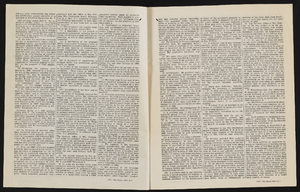Search the Special Collections and Archives Portal
Search Results
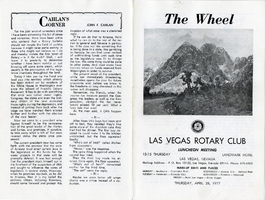
The Wheel Las Vegas Rotary Club newsletter, April 28, 1977
Date
Archival Collection
Description
Text
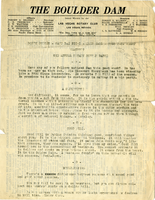
The Boulder Dam Las Vegas Rotary Club newsletter, March 10, 1927
Date
Archival Collection
Description
Text
Howard Hughes Public Relations Reference Files
Identifier
Abstract
The Howard Hughes Public Relations Reference Files (1931-1997) were compiled by Richard "Dick" Hannah, vice-president of the Los Angeles public relations firm Carl Byoir & Associates, which was hired to direct public relations for Hughes’ companies. The collection is primarily composed of newspaper clippings organized into reference files. A significant number of the files contain articles about Howard Hughes’ personal life, the operations of his companies, and legal and political disputes involving Hughes and his companies. The files also document a range of other subjects related to his business ventures, including aviation, aerospace, defense industries, motion picture studios, film stars, communism in Hollywood, and the House on Un-American Activities Committee (HUAC). Later in life Hughes became obsessed with how he was being portrayed in the media. In addition to collecting magazine articles, newspaper clippings, transcripts, screenplays, and books that referenced him. He also collected newspaper clippings about the activities of print media outlets, columnists, radio-television stations, current and former employees, and competitors. The collection also contains newspaper clippings about Watergate, organized crime, gambling, and Las Vegas and contains press releases, correspondence and records generated by Carl Byoir & Associates as well as Rosemont Enterprise, Inc.
Archival Collection

John Fudenberg oral history interview: transcripts
Date
Archival Collection
Description
Oral history interviews with John Fudenberg conducted by Barbara Tabach and Claytee D. White on May 3, 2018 and May 23, 2018 for the Remembering 1 October Oral History Project. In this interview, John Fudenberg, the coroner for Clark County in Las Vegas, Nevada, gives an account of his experience during the October 1, 2017 mass shooting on the Las Vegas Strip and what his role was during the tumultuous days after the shooting. He explains how he and the staff of the coroner's office prepared for the large number of casualties as well as their arrival at the Route 91 Harvest festival venue. Fudenberg speaks of setting up the Family Assistance Center at the convention center and how it supported the community but also aided the coroner's office in gathering information about the deceased and identifying them. Fudenberg discusses the main job of the Coroner's Office during the first week after the shooting, which was to autopsy the bodies and communicate with the families, as well as the Police Department. He also talks about the emotional impact the shooting and its aftermath had on him and his staff members and the wellness program they implemented, of which trauma yoga and meditation had a large impact.
Text
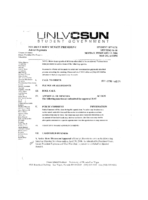
Meeting minutes for Consolidated Student Senate, University of Nevada, Las Vegas, February 13, 2006
Date
Archival Collection
Description
Text
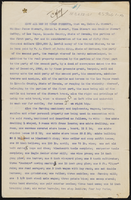
Stewart family real estate documents
Date
Archival Collection
Description
Stewart family real estate documents
Text
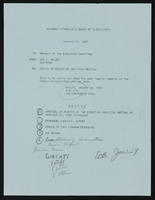
Economic Opportunity Board of Clark County (Nev.): memos, agendas, and meeting minutes
Date
Archival Collection
Description
From the Clark County Economic Opportunity Board Records -- Series I. Administrative. This folder contains memos, agendas and minutes from meetings of the Clark County Economic Opportunity Board from January 1969 through June 1969.
Text
Joyce Helens and Sonja Sibert (Great Basin College) oral history interview conducted by Magdalena Martinez and Elia Del Carmen Solano-Patricio: transcript
Date
Archival Collection
Description
From the Lincy Institute "Perspectives from the COVID-19 Pandemic" Oral History Project (MS-01178) -- Education sector interviews file.
Text

